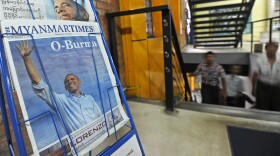
Michele Kelemen
Michele Kelemen has been with NPR for two decades, starting as NPR's Moscow bureau chief and now covering the State Department and Washington's diplomatic corps. Her reports can be heard on all NPR News programs, including Morning Edition and All Things Considered.
As Diplomatic Correspondent, Kelemen has traveled with Secretaries of State from Colin Powell to Mike Pompeo and everyone in between. She reports on the Trump administration's "America First" foreign policy and before that the Obama and Bush administration's diplomatic agendas. She was part of the NPR team that won the 2007 Alfred I. DuPont-Columbia University Award for coverage of the war in Iraq.
As NPR's Moscow bureau chief, Kelemen chronicled the end of the Yeltsin era and Vladimir Putin's consolidation of power. She recounted the terrible toll of the latest war in Chechnya, while also reporting on a lighter side of Russia, with stories about modern day Russian literature and sports.
Kelemen came to NPR in September 1998, after eight years working for the Voice of America. There, she learned the ropes as a news writer, newscaster and show host.
Michele earned her Bachelor's degree from the University of Pennsylvania and a Master's degree from the Johns Hopkins University School of Advanced International Studies in Russian and East European Affairs and International Economics.
-
Some argue the first visit by a sitting U.S. president to the country also known as Burma is too much reward for not enough political reform. But analysts say the trip could be a success if it focuses on the work still to be done.
-
Leading GOP senators vow to block U.N. Ambassador Susan Rice from becoming secretary of state if Obama nominates her and object to how she characterized the attack on the U.N. Consulate in Benghazi.
-
A Norwegian comedy duo managed something rare: to get concert goers cheering for a U.N. official.
-
Recent anti-American protests in the Middle East have stoked debate over what the U.S. role in the region should be. The Obama administration says the U.S. will continue to engage with new political movements in the region. Some argue for more concrete goals.
-
Israeli Prime Minister Benjamin Netanyahu is stepping up pressure on the Obama administration to draw clear red lines when it comes to Iran's nuclear program. But Israeli and U.S. observers say the issue has become too public.
-
The State Department is mourning those killed in the violence in Libya, while trying to calm the storm the anti-Islamic video has caused �� add to that, standing by free-speech principles and facing an ever-skeptical audience in the Arab world.
-
For more than three decades, presidential candidates have talked tough about China during the campaign season. But in the Oval Office, presidents have generally been much less aggressive.
-
Foreign policy hasn't been a major focus this election season, but whoever wins will face a delicate tangle of issues in the region. On top of a major decision about Iran, the U.S. must deal with a new government in Egypt, an intensifying war in Syria, and nervous allies in the Persian Gulf.
-
Iran is in the spotlight this week as it hosts a summit of nonaligned nations. U.N. Secretary-General Ban Ki-moon is attending, ignoring the advice of Israel and the U.S., which have been trying to isolate Iran. U.N. officials say Ban will bring a tough message to Iran. But others are skeptical.







